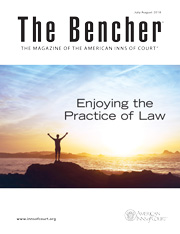The Lawyer as Advisor on “Other Considerations”
The Bencher—July/August 2018
By John P. Ratnaswamy, Esquire

 Lawyers facilitate client autonomy. This does not mean that lawyers are automatons. Both the Restatement of the Law Governing Lawyers and the American Bar Association’s Model Rule of Professional Conduct recognize that a lawyer may refer to other considerations than only the law in advising a client.
Lawyers facilitate client autonomy. This does not mean that lawyers are automatons. Both the Restatement of the Law Governing Lawyers and the American Bar Association’s Model Rule of Professional Conduct recognize that a lawyer may refer to other considerations than only the law in advising a client.
Section 94 of the Restatement 3d of the Law Governing Lawyers, is entitled “Advising and Assisting a Client—In General”. Subsection (3) states: “In counseling a client, a lawyer may address nonlegal aspects of a proposed course of conduct, including moral, reputational, economic, social, political, and business aspects.” The Comments indicate that Subsection (3) is derived from “lawyer codes”. The Comments recognize that whether to address such other considerations generally is a matter for the discretion of the lawyer, although there may be cases when it is required by the standard of care. “A lawyer’s advice on significant nonlegal aspects of a matter may be particularly appropriate when the client reasonably appears to be unaware of such considerations or their importance or when it should be apparent that the client expects more than narrow legal counsel. A lawyer is required to provide such assistance when necessary in the exercise of care to the extent stated in § 52 [the general provision on the standard of care].” Comment h. The Comments otherwise say little about this subject, other than briefly referencing the confidentiality and fee aspects. Id.
Similarly, ABA Model Rule 2.1, entitled “Advisor”, states in part: “In representing a client, a lawyer shall exercise independent professional judgment and render candid advice. In rendering advice, a lawyer may refer not only to law but to other considerations such as moral, economic, social and political factors, that may be relevant to the client’s situation.” Here, too, the Comments say relatively little on this aspect of being a lawyer. Comment [2] largely reiterates the language in the Rule, although Comment [3] discusses when there may be an exception if the client expressly or impliedly asks for “purely technical advice” (noting a possible distinction between clients who are experienced versus inexperienced in legal matters). Comment [4] cautions lawyers about going beyond legal questions into the domain of another profession.
Based the ABA’s Annotation of Model Rule 2.1, and my own searches, the subject of lawyers offering advice on other considerations is not addressed in detail in many court opinions or ethics opinions, nor even in many articles. See Annotated Model Rules of Professional Conduct (ABA 8th Ed. 2015), p. 315. The ABA Annotation’s few examples of opinions include Friedman v. Comm’r of Public Safety, 473 N.W.2d 828 (Minn. 1991), where the court, in discussing the scope of the right to counsel of persons stopped for drunk driving, stated that attorneys could play an important role in persuading problem drinkers to seek treatment, citing this aspect of the Minnesota version of ABA Model Rule 2.1. I, myself, have been involved in encouraging a client to consider remaining in involuntary alcoholism treatment.
I do not know, but I suspect that the apparently modest size of the literature reflects both the abstract nature of the subject matter and what I would infer is a relatively low probability of a lawyer’s acting or not acting to provide such advice leading to litigation or an ethics complaint.
I do not think it means that lawyers do not, or should not, render advice on other considerations in suitable instances. We are not automatons.
John P. Ratnaswamy, Esquire is a partner in the Chicago law firm of Rooney Rippie & Ratnaswamy LLP. He also serves as an Adjunct Professor of Legal Ethics at the Northwestern University School of Law. He is a former member of the American Bar Association’s Standing Committee on Ethics and Professional Responsibility and is the current chair of the ABA Solo, Small Firm, and General Practice Division Committee on Ethics and Professional Responsibility. This column should not be understood to represent the views of any of those entities or his or the firm’s current or former clients.